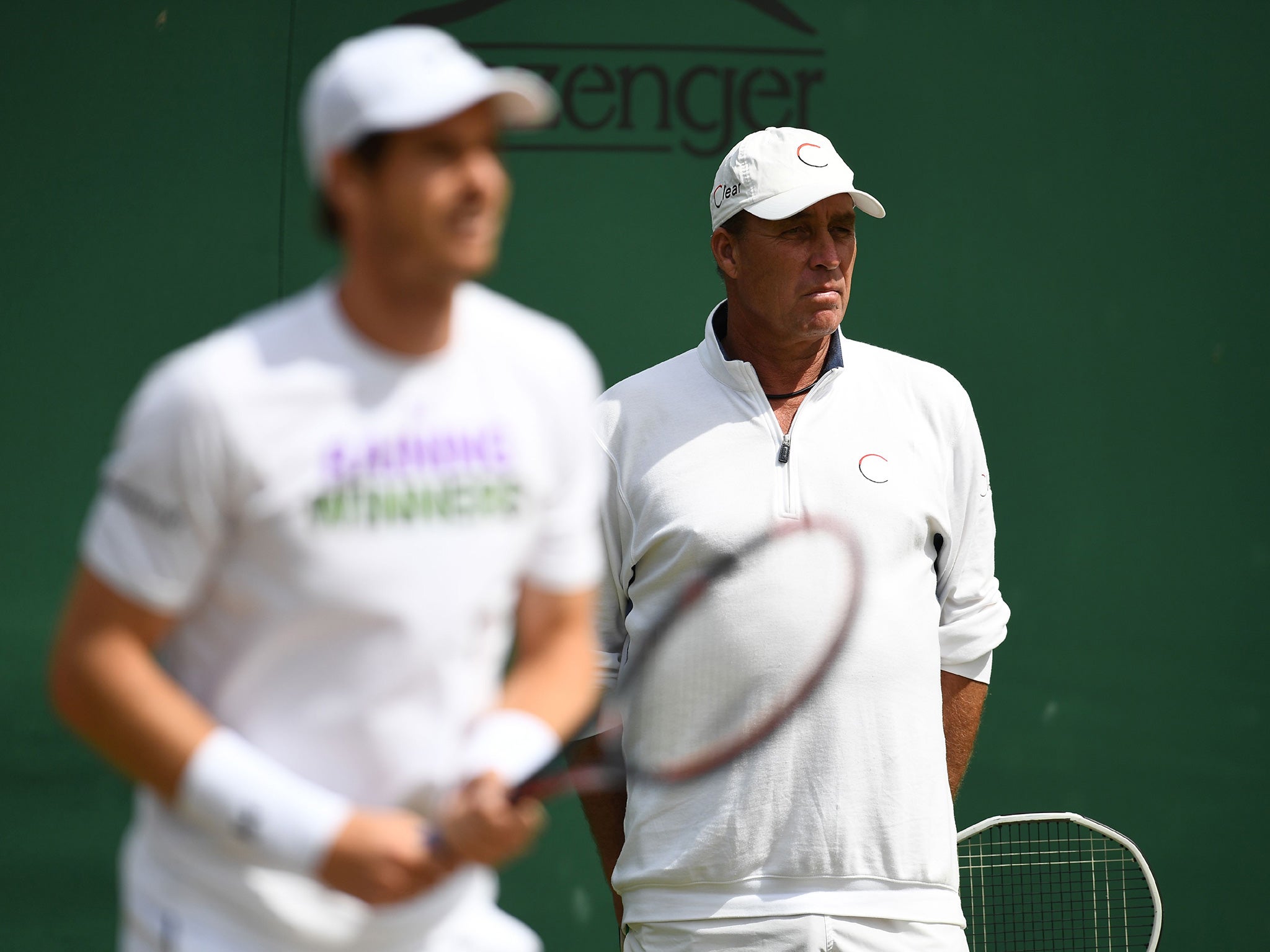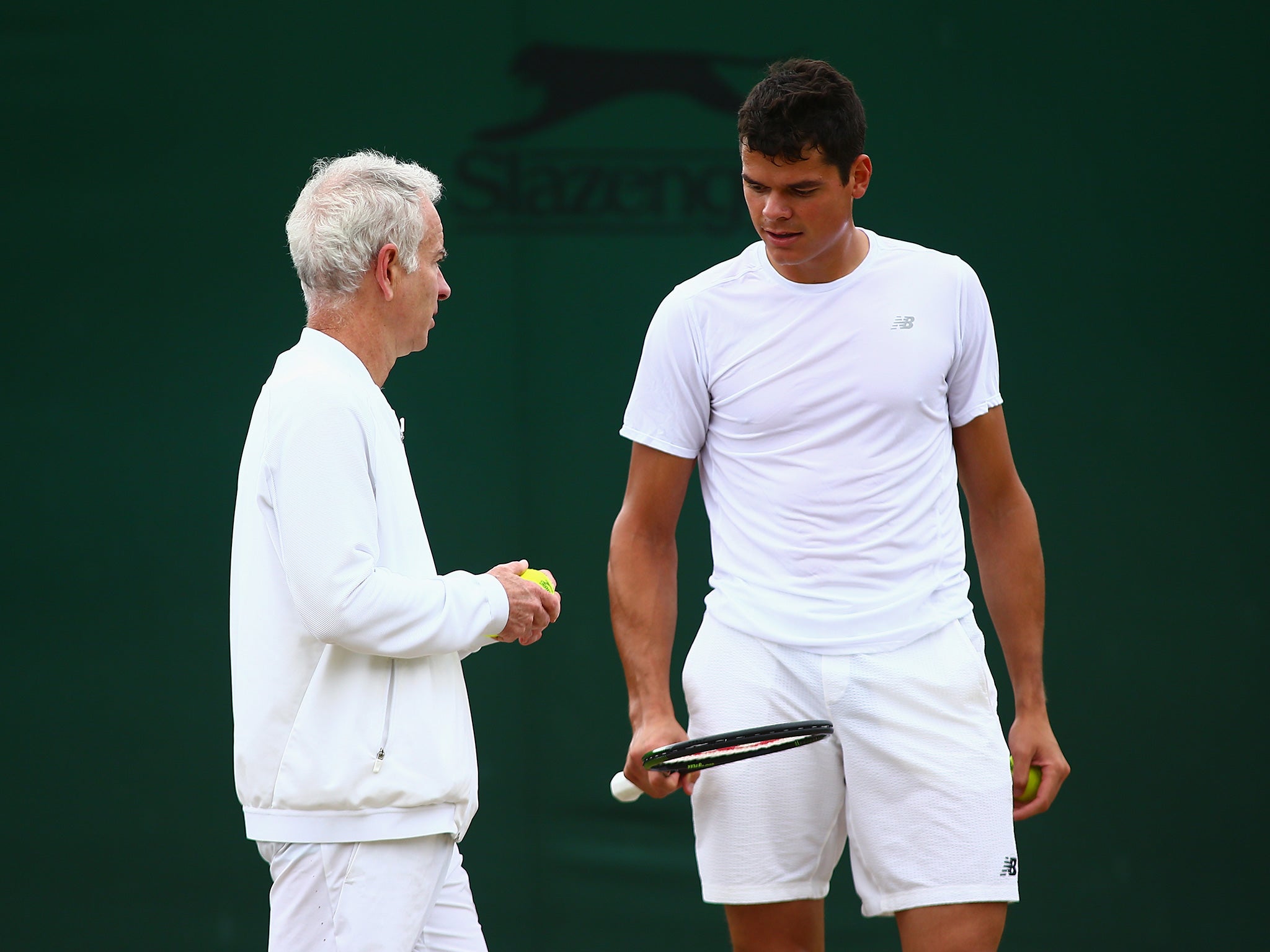Wimbledon 2016: Ivan Lendl's influence is starting to tell on Andy Murray ahead of Sunday's final
Much attention will be on the two finalists' coaches on the last day at SW19

Andy Murray and Milos Raonic will be the men stepping out on to Centre Court on Sunday, but there have been times in the last two days when you might have had the impression that Ivan Lendl was meeting John McEnroe in the men’s final at the 130th Wimbledon Championships.
The presence of so many legends of the game in the entourages of leading players has meant there has never been as much focus on coaches. That interest has reached a peak in the last month following Lendl’s return to Murray’s camp after a two-year break and the recruitment of McEnroe to help Raonic during the grass-court season.
The major protagonists, nevertheless, insist that the Lendl-McEnroe confrontation, 32 years after they first met in a Grand Slam final, is irrelevant. “I’m playing against Milos, I’m not playing against John, and Milos isn’t playing against Ivan,” Murray said. Lendl is even more dismissive. “It’s a non-issue, not worth the words or the paper,” he said.
McEnroe will be in the commentary box for the final, but Lendl will no doubt be in his usual position in Murray’s player box. And while Murray says the Lendl-McEnroe dynamic is irrelevant, he does not under-estimate the contribution of his coach. Lendl worked with him when he won his two Grand Slam titles, at the US Open in 2012 and here the following year.
“I do think in these situations it can make a difference,” Murray said when asked about the benefits that Lendl brings to him. “I don’t think he’d be doing this job if he didn’t believe in me and believe that I could win these events, because he doesn’t need to. That helps.
“But also the information I get from him, the psychological help that I get from having him around, being able to chat to him at these events, before the big matches, makes a difference. That’s why I think we’ve been a good team. I think we both trust each other.”
Murray did not consider it a coincidence that he had had his best results while working with Lendl. “I obviously wanted to work with Ivan again to try to help me win these events,” he said. “That’s the goal.”

The Scot said that Lendl’s return had already had a positive effect but added: “Over the next few months, I think, and at the end of the year, when I get time to train and work on things away from the court, is when hopefully I’ll start to really make bigger gains in my game. But just having him around has been positive.”
Murray has won 11 matches in a row since reuniting with Lendl, having beaten Raonic in the final of the Aegon Championships at Queen’s Club last month in their first tournament back together.
Lendl believes that Murray is now a better and more complete player compared with their previous time working together. He told ESPN: “If you look at the speed of shots, everybody is hitting the ball harder. Last time around people were serving 85mph, 90mph second serves. Now most of them are hitting around 100mph or over 100mph second serves. I think that’s just necessity because everybody else has got better returns. So when people get better returns, your second serve had better get better or you are in trouble.”
What had particularly pleased Lendl about Murray over the last fortnight? “Just how mentally engaged he has been the entire time,” Lendl said. “Practices and matches, it’s been great. He is mentally engaged playing every point in practice. That’s how you get better, being consistent in effort and consistently trying to do your best. That’s how you improve over a long period of time.”
Was that aspect of Murray’s work an improvement on their first period working together? “Definitely,” Lendl said. “He’s very focused.”
Murray said he had much in common with his coach. “I always like being around people,” he said. “I like company. I think he does as well. He just loves his golf. He loves competing and playing, having something to take his mind off tennis. I like that as well now. When I was younger, in my early twenties, tennis was the only thing I was focused on. Now obviously there’s family.”
Just having him around has been positive.
Nevertheless the Scot said that in all the time he had been working with Lendl they had had dinner together only twice. “We spend a decent amount of time together at the courts,” Murray said. “Away from that we don’t spend a lot of time together. We each have our own hobbies and he likes to get out of here fairly quickish after the day’s work is done. And I like that.”
Murray added: “He’s not on top of you all of the time. But when it’s time to work, he is there and he works really hard. I trust him as a person. He’s very solid. He will certainly never lie to you or bullshit you. And you don’t always find that. It’s not always that easy to find somebody like that.”
Lendl shows barely a flicker of emotion during Murray’s matches. He normally sits alongside Jamie Delgado, who joined the Scot’s entourage as a full-time coach earlier this year.
“We sit there and discuss what is happening,” Lendl said. “We discuss what we need to work on, what’s going well. When I’m sitting there I’m not just sitting blankly staring at the court. I’m processing what’s going on and what I need to be doing for the next match, four weeks from now, eight weeks from now, what needs to improve.”
I trust him as a person. He’s very solid. He will certainly never lie to you or bullshit you.
Lendl said it felt like he had never been away – “It felt very natural,” he said of his return – and that it had helped that he knew Matt Little, Murray’s physical trainer, from his previous spell working with the Scot. As for Delgado, who had taken sole charge of the world No 2’s preparations following Amelie Mauresmo’s departure, Lendl said: “We get along really well.”
In order to get a feel for what it might be like facing the big-serving Raonic, Murray had Delgado hitting serves at him from eight feet inside the baseline on the practice court on Saturday. “It’s a drill we do to try and get him up to speed against the top guys,” Delgado said. “Obviously when you play Milos the return is very important, so it’s about trying to sharpen him up.”
Murray has played in 10 Grand Slam finals already but this will be the first in which he has faced anyone other than Roger Federer or Novak Djokovic. It will also be the first in which he has faced an opponent ranked lower than him. Raonic, who will be making his debut in a Grand Slam final, is the world No 7.
The world No 2 hopes that his experience will be to his advantage. “Playing a Slam final obviously is different,” he said. “There’s a little bit more riding on the match. That’s what makes these events special.”
Does Murray ever watch videos of his 2013 triumph here, when he ended Britain’s 77-year wait for a men’s singles champion? “I haven’t watched the tape much in the last couple of years,” he said. “But at the time I watched it a lot for a few months afterwards - the end of the match and a few highlights.”
Despite his experience of playing in many Grand Slam finals, Murray said the excitement and nerves never diminished. “Maybe now I’m more excited than when I was younger,” he said. “I guess the tournaments start to mean more to you the older you get and you start to appreciate the history of the events probably more as you get older. When you’re 18 or 19, you’re probably not as aware about those things.
“So it never feels normal. I never take it for granted. I know how difficult it is to make the finals of these events and how hard they are to win.”
Join our commenting forum
Join thought-provoking conversations, follow other Independent readers and see their replies
Comments
Bookmark popover
Removed from bookmarks